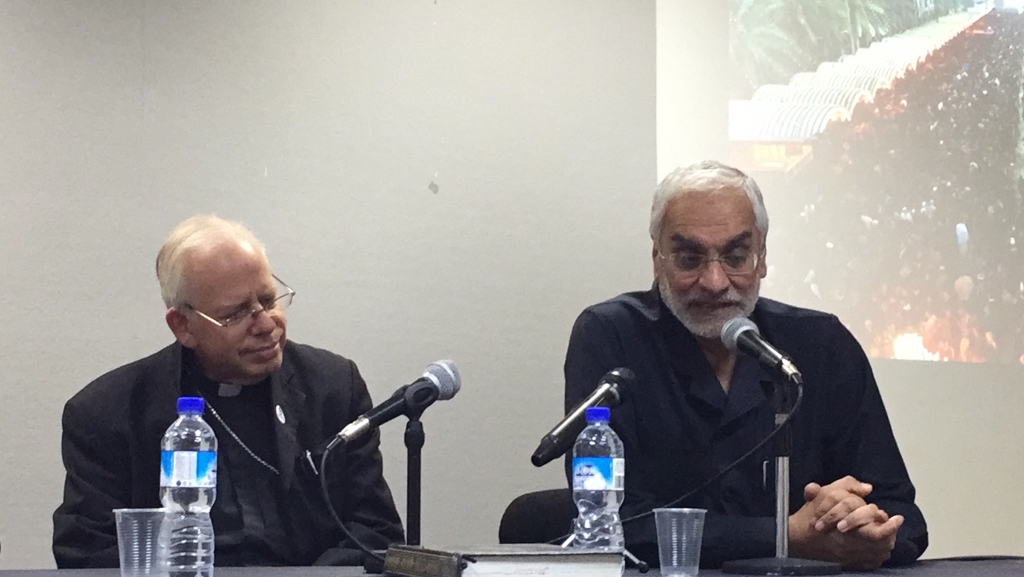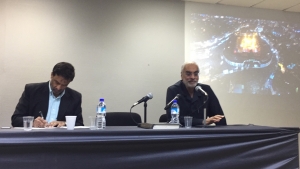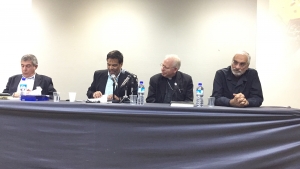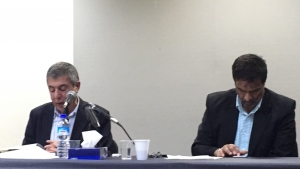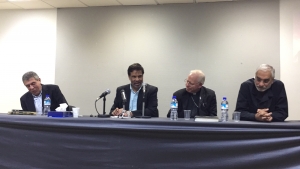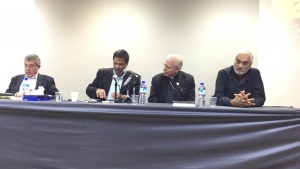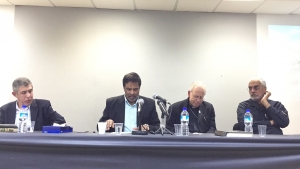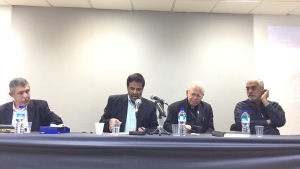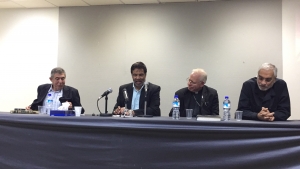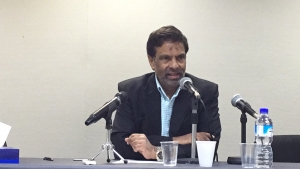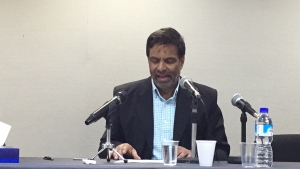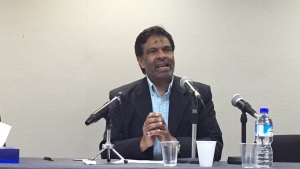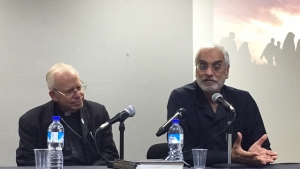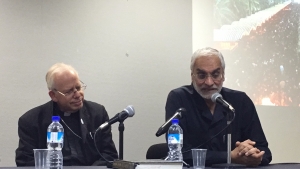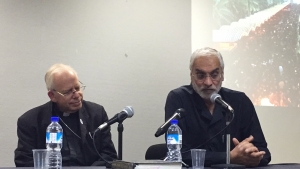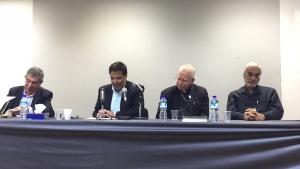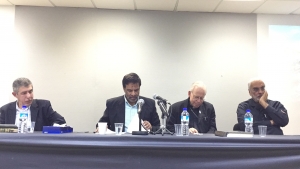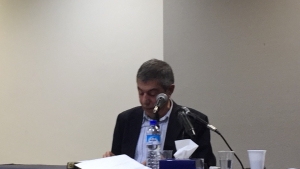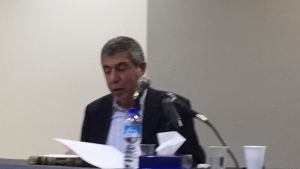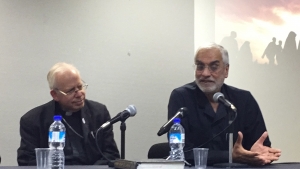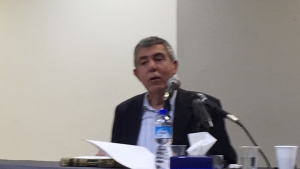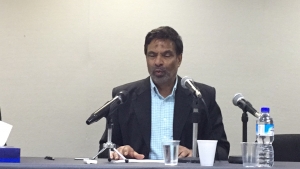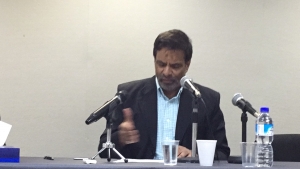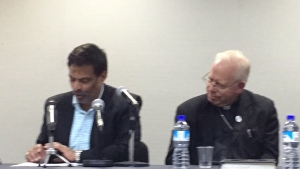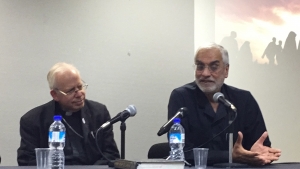 Open discussions/ Gulf Cultural Club
Open discussions/ Gulf Cultural Club
Significance of Ashura;
Notions of Martyrdom, justice and reform
Mohammad Iqbal Asaria, CBE*
Bishop Hendricks **
Dr Abdul Haq AlAni***
The martyrdom of Imam Hussain in 680 AD was a momentous event in the early part of the Islamic history. He is the grandson of Prophet Mohammad and son of Ali, the fourth caliph. His strong faith in the divine message of his grandfather pushed him to take a stand against the Umayyad ruler, Yazid, whom he viewed with contempt and vocal criticism. When he made his last stand in Karbala with 72 of his relatives and companions, he declared the aim of his movement; to seek reform and justice in the community left behind by his grandfather. He was subsequently martyred with those loyal individuals, only to remain a source of inspiration for the millions who continue to seek justice, reform and dignity.
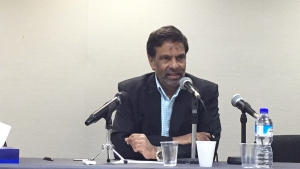 Wednesday 19th October 2016
Wednesday 19th October 2016
Chairman Shabbir Razvi: I would like to start with a couplet from a famous Urdu poet who said when mankind awaken they will all call Hussein is ours. So that is the essence, the message of this martyrdom which took place on the plains of Kerbala in Iraq. The martyrdom of Imam Hussein in 680AD was a momentous event in the early part of Islamic history. His is the grandson of the Prophet Mohammed and son of Ali one of the four caliphs. His strong faith in the message of his grandfather forced him to take a stand against the Ummayad rulers of that time, Yazid in particular who was the king of the Muslim empire who he viewed with contempt and vocal criticism.
When he made his last stand in Kerbala with 72 of his relatives and companions he declared that the aim of his movement was to seek reform and justice in the community left behind by his grandfather. He was subsequently martyred with those local individuals only to remain a source of inspiration for the millions who continue to seek justice, reform and dignity.
The Islamic calander (Muharram) starts with a particular tragedy and it is commemorated all over the Muslim world whether one is Shia or Sunni all Muslims do commemorate it. Over the last couple of weeks I have been receiving emails from some of my Arab friends in the Middle East saying congratulations on the 1st of Muharram. So that is another trend which is developing to congratulate rather than think of the significance.
I do not want to take too much time of the speakers. I just want to relate one particular story that I experienced here in London some years ago. This is where the whole narrative of this particular movement needs to be looked at and presented in a manner which resonates with the people and ordinary individuals living in London, Paris New York or Sydney. There is usually a demonstration on the 40 day of Muharram and other demonstrations that take place to commemorate this particular occasion. About ten years ago there was one white Anglo Saxon protestant who came over to a young man who was distributing leaflets in Marble Arch and asked him out of curiosity as to why this particular demonstration was taking place. And this young man, with whatever knowledge he had, started saying that Yazid was a horrible man. He used to drink alcohol, he used to fornicate, he was a gambler and he used to have a dog at home. And the English man said I do all these things and I have a dog at home. After the discussion I asked the young man to come over and I said to him if you said he was like Hitler people would have understood clearly who Hussein was and who Yazid was and how the politics of time resonates with what has happened historically last century and what is happening in the Middle East currently. Tribal rulers are using their power in a similar manner to Yazid. There is another saying in the Islamic phraseology which says that every place is Kerbala and every day is Ashura. This is a stand to take up against oppression. This brings us to 2016 when we see all kinds of monstrosities being committed against ordinary people. There is killing in Aleppo and Mosul. All the economic crises that ordinary people here in the West are facing. So it is an oppression of a different type.
 Mohammad Iqbal Asaria: I would like to thank the foundation for inviting me and to Shabbir for introducing the subject. I am just going to set the scene here. I would also like to start with a couplet from Chishti founder the Chishti tariqa. In the context of Kerbala he says: “Hussein is king and Hussein is king of kings. Hussein is religion and Hussein is the establisher of religion. Hussein is the person who did not bow down to Yazid when it came to truth and justice he did not bow down to Yazid and he was sacrificed. Chishitiis one of the close followers of the Ahl Al Bayt and the tradition and a leading tariqa.
Mohammad Iqbal Asaria: I would like to thank the foundation for inviting me and to Shabbir for introducing the subject. I am just going to set the scene here. I would also like to start with a couplet from Chishti founder the Chishti tariqa. In the context of Kerbala he says: “Hussein is king and Hussein is king of kings. Hussein is religion and Hussein is the establisher of religion. Hussein is the person who did not bow down to Yazid when it came to truth and justice he did not bow down to Yazid and he was sacrificed. Chishitiis one of the close followers of the Ahl Al Bayt and the tradition and a leading tariqa.
We want to put this whole subject matter into context. I would like to begin by trying to say something which Ibn Khaldoun in his mukadama outlines. He was a great Maghrebi historian. He is one of the early founders of the methodology of history. History is much more than a chronology of events. History needs to be understood at a much deeper level.
Ibh Khaldoun takes a much more sociological approach to history whereby he goes beyond events. He says that generally civilisations rise and fall in a very predictable pattern. You have people who come together who develop, who specialise and who become wealthier and normally this development is tied to blood relationships and fellow feelings among a select group of people.
When they become, what we call today, developed and cultured, they have a problem. Now they do not want to fight for their defence. So they normally recruit mercenaries and in time these mercenaries take over their empire as they have no capacity to defend their empire. So the ebbs and flows of civilisations move like that, mainly on asabia (blood relationships).
This is what I see when I read history. This is how things developed. When I come to the time of the Prophet we see, as Ibn Khaldoun said that the early followers of the Prophet are not from his family. The majority of the Quresh are his ardent opponents. It is they who tried to kill him several times after he refused to submit. So among his followers you will find people like Bilal who is African, Salman who is Persian and Abu Zeid who is nowhere near the Quresh elite. So really people in the peripheries of their society. So the Prophet wants to preach his religion quite contrary to the norms of history which I have seen. So it is really the power of the message which carried this. Many of the Quresh joined later. But this is the initial scenario when times were the most trying. It was supported by these people, Amar, Mikdad.
And this really created a new ambiance in the culture of Mecca and Medinah that tribal ties, blood ties were there but they were not dominant. The Prophet introduced a completely new paradigm that it was the strength of your belief (iman) and your behaviour (taqa) which counted. Whoever was better in this was the leader. There was no question.
This new intervention in history with the Prophetic charisma and power never went down well with the old order. We know that his uncles and his tribesman only accepted Islam in the last couple of years. They always had it in their mind that they would somehow overturn this order. They could not live with this kind of order. They had to go back.
So 40 years after the Prophet died you find the old trend reasserting itself Ibn Khaldoun says. This is what I see. The rise of nepotism, clannishness and favouritism which over comes the Muslim community. He is trying to bring back that order which the Prophet totally destroyed. We see people resisting and not being able to do much. Other groups gained power over a period of time.
This is the question in a religious context at the centre of justice. Justice is based on fundamentally the rule of law, or the rule of the vision of Islam and accountability. If you lose either of these gradually society will degenerate. The simple example was that while the first caliphs after the Prophet used to refer to themselves as khalifat rasul Allah, we are the successors to the Prophet. After Imam Ali these people started to refer to themselves as khalifat Allah. We are directly from Allah, we have no need for the Prophet here, we have our own authority which we can appoint.
Other things started to happen. This is something which we need to take on board. A lot of non Arab people started to accept Islam. Those who were called malawis and so on. Quite a lot of Iranians and other people. And now the question of the distribution from the Bait Al Maal came. There was a tendency to start a differential distribution of wealth from the Bait Al Maal depending on whether you were Arab or Malawi or this and that.
This kind of development in that society clearly required a check. So what we see in the movement of Imam Ali is clearly that break. So here we have Yazid sending an order to Imam Hussein that you must pledge allegiance to me. In that context effectively it means you must legitimise my khalifat. Imam Hussein says this cannot be done given your character and your conduct. If I do that as the last surviving grandson of the Prophet then Muslims will take that as the norm and we are gone.
He said ‘okay let me go – I don’t pledge allegiance.’ But Yazid said no you have to pledge allegiance and this led to the events of Kerbala where you had this gruesome massacre which ultimately woke up the consciousness of the Muslim community that there is a message here that needs to be understood in the context of justice and the principles of Islam. And all Muslims have agreed that this was a very wrong turn of events. In the context of Ibn Khaldoun this was one of the ways that Ibn Ummayad tried to bring back blood relationship and kingships into the Islamic fold.
The events of Kerbala happened. You can see how much control they exercised on information. For several years after Kerbala there was a practise of cursing Imam Ali from the pulpit just in order to make sure that that legitimacy was not questioned. The next year after Kerbala when Yazid tired to submit Medina to his will they objected and he ransacked Madina, he destroyed the Prophet’s mosque and then he destroyed Mecca as well and for three days there were no prayers in the Prophet’s mosque. And they tried to tie their horses there. This kind of behaviour clearly shocked the community. But anybody objecting would be put to death. So there was a complete control on information.
The last point is that when it comes to the matter of justice it is not only sacrificing your life but also finding a way to propagate your cause. If you look at the people who were left behind in Kerbala, the family of the Imam, especially his son Imam Zine El Abdine who was ill they had to figure out how to break the strangle hold on information.
I think they found a most ingenious way round. In Damascus and elsewhere they started to get together in their families and mourn the events of Kerbala, loudly and publically. Nobody could stop them mourning but these mourning ceremonies spread across the people who wanted to convey the message. What we see today across the Islamic world is those mourning ceremonies being practised. It has become a very standard way of publicising this injustice.
So here you have in this example of Imam Hussein and his family the upholding of the principles of justice, even at the cost of your life and a methodology or propagating that cause. Salam Alekium.
Bishop Paul Hendricks: I would like to add to the background notes when I became a bishop, when anyone becomes a bishop in the Catholic Church, they ask you in addition to your local duties what would you like to do at national level. We all get involved in these different tasks. I said that I would prefer something to do with dialogue with other churches and other faiths. So I am very happy that they agreed to that. So in the last ten years I have been very much enjoying all forms of dialogue because I find that tremendously enriching. It really helps me to deepen my own faith as well as to learn more about other faiths.
Taking the title martyrdom, justice and reform I think if we were going to examine Christian ideas of justice and reform we would find that they are very much the same as Islamic ideas. But it seems to me that when it comes to the concept of martyrdom there are very important differences. For that reason I want to concentrate on that theme in the concept of martyrdom.
The very word martyr means witness and in the case of Imam Hussein a witness to certain principles as we have just been hearing – principles of justice and reform against the misuse of religion by those in power. It seems to me that this is a very serious issue – the misuse of religion by those in power. It was very common throughout the centuries and sadly is very much with us today throughout the world in all sorts of situations. It is said that the perversion of that which is good leads to that which is worse. For that reason I do believe that misuse of religion is very serious matter.
As I understand it, Ashura and Muharram are observed with emotions of sadness and regret for the injustices that have occurred in the past as well as a resolve to promote justice in our own time. In the Christian tradition the concept of martyrdom is very different. It is much more positive. That will sound very strange. I need to explain that and in order to do so I need to touch on a fundamental feature of Christianity. I would say that without understanding this one cannot understand Christianity.
The essential Christian message is not a set of commandments or even teachings about God but a statement about a certain historical event. We believe it is historical. That Jesus died and rose from the dead. People have different views on that but it is what we believe.
Consequences follow from that and Christian doctrine and theology is based on that. But the primary thing is a historical statement Jesus died and rose from the dead. Amongst the consequences would be the idea that that rising from the dead vindicates the claim that Jesus in the Messiah. The word Christ is Greek for messiah and also that he is the son of God. It took Christians centuries to work out exactly what that implied. That would be a very long story.
But along with the belief in the resurrection of Jesus there is also the belief that he promises to share that with us if we are faithful to him. It is no accident that the entry into being a Christian is baptism which has a very evocative symbolism, the idea of going down into the water of baptism and coming up the other side. There is a fundamental text in St Paul’s letter to the Romans, chapter 6 which says that as we go into the water we die as it were symbolically with Christ in order to rise up with him to a new life.
It is a difficult thing to explain because it is symbolic. Obviously we do not literally die but on other hand it is more than just a sign. It does have an effect in our life. Its quite a subtle idea. This dying with Christ and rising to a new life is something which happens already in this life and continues through into the next life. This is very closely associated with the idea of martyrdom. The martyrs are seen as the greatest possible witnesses to that faith in the resurrection. Clearly if you are just about to die you have not got any prospects in this life so you would not be willing to sacrifice your life unless you obviously very firmly believed in our future in the next life.
It is also essential to realise that this is not simply just a choice to die. It is not something which his chosen directly. It is a choice to accept death rather than to renounce one’s faith in Jesus. One good example of this would be Saint Thomas Moore who died about 400 years ago. He was a lawyer and he was very clear about this. He said he was perfectly happy to make any statement that the king wanted him to make if it was consistent with his conscience. He would not seek death. But when he found himself in a position where he was no longer able to do that, when in order to obey the king’s command he would have to do something which he could not do with a clear conscience, he accepted death rather than do something which he knew was wrong. It seems to me that the concept of ashura would be similar. Not seeking death but being willing to sacrifice ones life if it is necessary to uphold justice.
On the other hand it does require a choice. Someone who is simply killed for being a Christian is not automatically a martyr if no choice is involved. If someone were to come up and shoot me just out of the blue, even if it was because I was a Christian that would not make me a martyr. I would only be a martyr if I had a choice either to be shot or to renounce my faith in Christ.
It may be indirect. There is a good example in the death of Oscar Romero who championed the poor and criticised injustice in El Salvador. He knew that this would make him a target and he had received death threats. He nevertheless persisted in doing what was right and insisted in campaigning in rights for the poor. So he is rightly regarded as a martyr even though at the moment of his death he was not presented with a choice but it was the consequence of a choice that he had made earlier.
In the earliest centuries when Christianity was illegal martyrdom was relatively common in the time of the Roman empire until it became legalised under Constantine. In those days martyrdom was seen as the perfect way of following Jesus for two reasons. One – it imitates him in his death. In that sense we are following in his footsteps. It also implies the ultimate degree of faith for the reason I have given. You can’t express your faith more perfectly than be willing to be killed rather than to renounce it.
There is an ancient saying that the blood of the martyrs is the seed of the church and it is very much one of the reasons why Rome has a pre-eminence as a Christian centre, not just because of Saint Peter and being the first pope and so on but because of the large number of martyrs that are associated with Rome.
Once Christianity was legalised than persecution and martyrdom became much less common. It didn’t die out altogether as we know. There are many martyrs in our own time but nevertheless it was much less common. So the question arose how would one follow Jesus perfectly now that martyrdom is not a common option. And that is where we find the origins of the monastic movement and the religious life. It is a different sort of witness but there is one similarity. Because a monk or nun does not marry they have no children and in a certain sense they have no future in worldly terms. In a certain sense your children are your future. So in that sense, like martyrdom, it is a sign of our faith in a future life with Jesus.
I would conclude by saying that martyrdom is absolutely central to Christianity. Not that you have got to be a martyr in the literal sense but the basic concept of martyrdom is very closely tied up with what Christianity is about. Christianity is not just about how to live a moral life, observing justice. We even fail in that. We do not measure up purely in terms of justice. We all fail in many ways. But the idea of death and resurrection being at the heart of our religion does fundamentally affect its character.
You can see the contrast if you look at something like the Book of Proverbs in the Old Testament. Basically the message is do good and you will prosper. But at the heart of Christianity there is a paradox that is associated with the whole symbol of the cross: the life, death and resurrection of Jesus. That paradox that says you can only live fully be being willing to die. Thank you.
Dr Abdul Haq AlAni:
What I am going to say is non-conventional and may not be well received by some but I know no other way but to say what I believe when invited to talk.
I am not out to antagonize, insult or upset but I want to let those who are willing to listen realize that the roads to the Lord are as many as his creation.
I base what I say on the Qur’an and my interpretation of that text, and my interpretation, I believe, is as good as any.
I shall be reciting verses from the Qur’an in Arabic as I should, but would follow that recitation with as good an English interpretation as is possible.
To talk about Justice and martyrdom from and Islamic perspective takes me to Qur’anic text on the creation of Adam and disobedience of the Devil. There are several references to the event in different chapters of the Qur’an.
To begin with, Allah is God’s name in Arabic and he is called in our part of the world with that name by Muslims, Christians, Jews, Sabeans, etc..
I shall recite mainly the verses in Chapter 7.
وَلَقَدْ خَلَقْنَاكُمْ ثُمَّ صَوَّرْنَاكُمْ ثُمَّ قُلْنَا لِلْمَلَائِكَةِ اسْجُدُوا لِآدَمَ فَسَجَدُوا إِلَّا إِبْلِيسَ لَمْ يَكُن مِّنَ السَّاجِدِينَ
And We have certainly created you, [O Mankind], and given you [human] form. Then We said to the angels, “Prostrate to Adam”; so they prostrated, except for Iblees. He was not of those who prostrated.
قَالَ مَا مَنَعَكَ أَلَّا تَسْجُدَ إِذْ أَمَرْتُكَ ۖ قَالَ أَنَا خَيْرٌ مِّنْهُ خَلَقْتَنِي مِن نَّارٍ وَخَلَقْتَهُ مِن طِينٍ
[ Allah ] said, “What prevented you from prostrating when I commanded you?” [Iblees] said, “I am better than him. You created me from fire and created him from clay.”
قَالَ فَاهْبِطْ مِنْهَا فَمَا يَكُونُ لَكَ أَن تَتَكَبَّرَ فِيهَا فَاخْرُجْ إِنَّكَ مِنَ الصَّاغِرِينَ
[Allah] said, “Descend from Paradise, for it is not for you to be arrogant therein. So get out; indeed, you are of the debased.
قَالَ أَنظِرْنِي إِلَىٰ يَوْمِ يُبْعَثُونَ
[Iblees] said, “Reprieve me until the Day they are resurrected.”
قَالَ إِنَّكَ مِنَ الْمُنظَرِينَ
[Allah] said, “Indeed, you are of those reprieved.”
قَالَ فَبِمَا أَغْوَيْتَنِي لَأَقْعُدَنَّ لَهُمْ صِرَاطَكَ الْمُسْتَقِيمَ
[Iblees] said, “By what you had tempted me, I will surely sit in wait for them on Your straight path.
ثُمَّ لَآتِيَنَّهُم مِّن بَيْنِ أَيْدِيهِمْ وَمِنْ خَلْفِهِمْ وَعَنْ أَيْمَانِهِمْ وَعَن شَمَائِلِهِمْ ۖ وَلَا تَجِدُ أَكْثَرَهُمْ شَاكِرِينَ
Then I will come to them from before them and from behind them and on their right and on their left, and You will not find most of them grateful [to You].”
قَالَ اخْرُجْ مِنْهَا مَذْءُومًا مَّدْحُورًا ۖ لَّمَن تَبِعَكَ مِنْهُمْ لَأَمْلَأَنَّ جَهَنَّمَ مِنكُمْ أَجْمَعِينَ
[Allah] said, “Get out of Paradise, reproached and expelled. Whoever follows you among them – I will surely fill Hell with you, all together.”
In Chapter 39 of the Qur’an, Allah imposes a restriction on Iblees’ freedom but it is only limited to those few faithful!
It seems apparent from the above verses that Allah granted Iblees perpetual life from the day of his disobedience until a specific Day and a free hand on Earth.
Iblees asked permission to tempt Allah’s creation and Allah granted him that right.
By accepting that, we are bound to accept that such an arrangement is at the heart of Allah’s plan for Earth (not The Heavens) and the creation on Earth. In fact it means that Allah has ordained from the beginning of creation that Justice will not prevail on Earth so long as Iblees has a free hand. The only time when Justice will prevail is when Iblees’ reprieve finishes on a day unknown to us because Allah does not tell us in the Qur’an when that is.
It follows that Earth will be in the hand of Ibless and his decedents. The only short times during the history of man when darkness does not prevail on Earth is during the short eras of his Messengers and Prophets, which are like short pulses of light in the dark history of time.
I shall take two leaves from that history to show what I mean, namely that of Jesus and Hussein in relevant to both Justice and Martyrdom.
Jesus (PBUH) is a unique figure in the Qur’an and many Muslims do not really appreciate that reality.
The essence of Jesus in Qur’an is like no other entity. Qur’an says in Chapter 59:
إِنَّ مَثَلَ عِيسَىٰ عِندَ اللَّهِ كَمَثَلِ آدَمَ ۖ خَلَقَهُ مِن تُرَابٍ ثُمَّ قَالَ لَهُ كُن فَيَكُونُ
the example of Jesus to Allah is like that of Adam. He created Him from dust; then He said to him, “Be,” and he is.
It is important to consider the above verse.
Allah tells us that Jesus was not born as a decedent of Adam as we all are. He is a new creation on his own. As he has no decedents of his own then he remains a single creation of one single being. That is a case the like of which is not repeated in the Qur’an and which makes Jesus stand out as a unique manifestation.
Jesus is described in the Qur’an as having manifested so many Divine characteristics some of which even the Bible does not acknowledge. He spoke on first day of his birth; brought the dead back to life (this is in the Bible: Lazarus)!, created a bird of clay and gave it life; cured leprosy, made the blind see, all in addition to what the Bible tells about him.
Yet when it came to his crucifixion, he submitted and showed no divine capability. My brethren Christians have an explanation which I do not accept. They argue it was Allah’s design to send his only son to suffer for our sin and save us.
The Qur’an tells the crucifixion as follows:
وَقَوْلِهِمْ إِنَّا قَتَلْنَا الْمَسِيحَ عِيسَى ابْنَ مَرْيَمَ رَسُولَ اللَّهِ وَمَا قَتَلُوهُ وَمَا صَلَبُوهُ وَلَٰكِن شُبِّهَ لَهُمْ ۚ وَإِنَّ الَّذِينَ اخْتَلَفُوا فِيهِ لَفِي شَكٍّ مِّنْهُ ۚ مَا لَهُم بِهِ مِنْ عِلْمٍ إِلَّا اتِّبَاعَ الظَّنِّ ۚ وَمَا قَتَلُوهُ يَقِينًا
بَل رَّفَعَهُ اللَّهُ إِلَيْهِ ۚ وَكَانَ اللَّهُ عَزِيزًا حَكِيمًا
And [for] their saying, “Indeed, we have killed the Messiah, Jesus, the son of Mary, the messenger of Allah .” And they did not kill him, nor did they crucify him; but [another] was made to resemble him to them. And indeed, those who differ over it are in doubt about it. They have no knowledge of it except the following of assumption. And they did not kill him, for certain.
Rather, Allah raised him to Himself. And ever is Allah Exalted in Might and Wise.
I accept the Qur’anic version which is not the general perception among Muslims who seem to simply claim that Jesus was not crucified. But that is not the incident as told in the Qur’an. There was a crucifixion and the perpetrators of the crime and onlookers saw what appeared like Jesus being put on the Cross. So far there is no difference between the Christian belief and the Qur’anic version.
The difference lies in the Qur’an stating that what happened is that Jesus body and soul ascended to Heavens and the flesh put on the Cross was that of a body made by Allah who had the look of Jesus but was not in essence Jesus.
I will leave the explanation of why I believe this version until I finish the incident of the martyrdom of Hussein (PBUH)
The story of Hussein is not Qur’anic because the Book tells us explicitly about what had happened before. However, there is enough historical evidence to support the essence of what happened on that sad day on the 10 Muharrem AH 61.
It is all part of the Divine Will that both the apparent killing of Jesus and Hussein took place so that the belief of the true believers is strengthened
ولكن لِّيَقْضِيَ اللَّهُ أَمْرًا كَانَ مَفْعُولًا لِّيَهْلِكَ مَنْ هَلَكَ عَن بَيِّنَةٍ وَيَحْيَىٰ مَنْ حَيَّ عَن بَيِّنَةٍ ۗ وَإِنَّ اللَّهَ لَسَمِيعٌ عَلِيمٌ
But [it was] so that Allah might accomplish a matter already destined – that those who perished [through disbelief] would perish upon evidence and those who lived [in faith] would live upon evidence; and indeed, Allah is Hearing and Knowing.
Did not Jesus and Hussein know what was awaiting them? I have no doubt in my mind as to what the answer is. Jesus who told the people of Palestine that:
وَأُنَبِّئُكُم بِمَا تَأْكُلُونَ وَمَا تَدَّخِرُونَ فِي بُيُوتِكُمْ ۚ إِنَّ فِي ذَٰلِكَ لَآيَةً لَّكُمْ إِن كُنتُم مُّؤْمِنِينَ
And I inform you of what you eat and what you store in your houses. Indeed in that is a sign for you, if you are believers.
Ought to have known what was going to happen to him.
If Hussein had no divine message to his fate, then he ought to have heeded his grandfather (PBUH) who told him repeatedly that he was going to be killed in Kerbala.
Could not Jesus and Hussein have reversed the awaiting fate? Indeed, Yes.
Both Jesus and Hussein had enough divinity to allow them to rely on one verse in Qur’an to do so.
وَلَوْ أَنَّ قُرْآنًا سُيِّرَتْ بِهِ الْجِبَالُ أَوْ قُطِّعَتْ بِهِ الْأَرْضُ أَوْ كُلِّمَ بِهِ الْمَوْتَىٰ ۗ بَل لِّلَّهِ الْأَمْرُ جَمِيعًا ۗ
And if there was but this Qur’an by which the mountains would be removed or the earth would be broken apart or the dead would be made to speak, but to Allah belongs the affair entirely.
If either of them did not know how to invoke that power in the Qur’an then neither of them is worthy of the Divinity in him. But I believe that both had it.
If Jesus wanted with one sign from his finger he would have turned only Jerusalem but the whole Roman Empire into waste. A man who raises the dead is certainly capable of such an act!
If Hussein wanted he would have had the five thousand Angles who fought with his father and grandfather in the Battle of Badr uprooting Yezid’s army from Kebrala up to Damascus.
So why did neither Jesus nor Hussein attempt to show such Divine power when it was needed?
The reason is in the Divine design for Earth as Allah Willed when HE made Adam and allowed Ibless to disobey.
It is so elegantly explained by a narrative attributed to Hussein’s father during the years of fighting Mua’wyiah, Yzazid’s father.
He is reported to have said once that: “If I wanted I would have run across the desert from Kufa to Damascus; entered Mua’yiah’s palace; kicked him with my small feet and knocked off his throne.
بَلْ عِبَادٌ مُّكْرَمُونَ
لَا يَسْبِقُونَهُ بِالْقَوْلِ وَهُم بِأَمْرِهِ يَعْمَلُونَ
Rather, they are [but] honored servants. They cannot precede Him in word, and they act by His command.”
Allah had wanted events to be as they happened.
I come to my concluding remarks which do not fit well with both Christian and Shi’s theology.
I believe that neither Jesus nor Hussein suffered in any way.
It is impossible for me to accept that while Allah is the absolute Justice, yet accept that He would punish an innocent member of His creation. If that be the case, then there is no Justice and we should never endeavour to ask for it.
As I do not subscribe to the concept of inherited sin in Christianity and that of arbitrary irrational Will as Muslims believe, then I cannot accept that Allah would inflict such horrific pain and suffering on two of His greatest creations in Jesus and Hussein!
I am sorry that I would disappoint many people when I say that my grandfather Hussein was not killed in Kebala by one insignificant soldier in the Devil’s army.
No my friends, Hussein did not have his heart severed just as much as Jesus was not nailed to the Cross. If my Muslim brothers are willing to accept that Jesus was not crucified, then it should be very plausible for them to accept that the same Allah who could not allow Jesus to undergo such suffering could not have allowed Hussein to suffer such a fate.
In both case it was done by Allah making a similar person take the punishment and pain and not Jesus or Hussein.
Hussein’s body and soul ascended to Heavens on 10 Muharrem AH 61 just as the body and soul of Jesus ascended to Heavens on Good Friday 7 April 30 or thereabout.
The incapability coming from the omnipotent is a manifestation of absolute capability.
*Mohammad Iqbal Asaria is special advisor to the Secretary General of the Muslim Council of Britain on business and economic affairs and a tutor on the MCB’s leadership development programme. In the late 1980s, he was the editor-in-chief of Afkar, a ground-breaking news and analysis journal published in London. Iqbal’s current interests are in Islamic and Moral Finance. He was awarded the CBE in the 2005 Queen’s Honours List for services to international development.
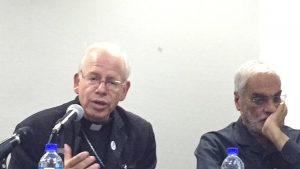 **Paul Hendricks was born in Beckenham, Kent on 18th March, 1956, After finishing school he went up to Corpus Christi College, Oxford in 1974 and was awarded a degree in Physics in 1977. He worked for two years at the GEC Hirst Research Centre, Wembley before going to study for the priesthood at the English College, Rome, from 1979 to 1985.He obtained a Licence in Philosophy from the Gregorian University, Rome. Ordained deacon at Palazzola, by Bishop Cyril Restieaux in 1983, he was ordained priest at Holy Innocents, Orpington, by Archbishop Michael Bowen in 1984.His first appointment, in1985, as assistant priest was to St Boniface, Tooting. In 1989 he was appointed Philosophy Lecturer and Bursar at St John’s Seminary, Wonersh. His next appointment was as parish priest of Our Lady of Sorrows, Peckham, in 1999 following the departure of the Capuchins. He also serves on the Diocesan Finance Committee and is the Diocesan Advisor on New Religious Movements and Cults. He was ordained by Archbishop Kevin McDonald on 14th February 2006. Bishop Paul Hendricks has responsibility for the South West pastoral area of the Diocese which comprises the Deaneries of BALHAM, CATHEDRAL, CROYDON, KINGSTON, MERTON, MORTLAKE and SUTTON.
**Paul Hendricks was born in Beckenham, Kent on 18th March, 1956, After finishing school he went up to Corpus Christi College, Oxford in 1974 and was awarded a degree in Physics in 1977. He worked for two years at the GEC Hirst Research Centre, Wembley before going to study for the priesthood at the English College, Rome, from 1979 to 1985.He obtained a Licence in Philosophy from the Gregorian University, Rome. Ordained deacon at Palazzola, by Bishop Cyril Restieaux in 1983, he was ordained priest at Holy Innocents, Orpington, by Archbishop Michael Bowen in 1984.His first appointment, in1985, as assistant priest was to St Boniface, Tooting. In 1989 he was appointed Philosophy Lecturer and Bursar at St John’s Seminary, Wonersh. His next appointment was as parish priest of Our Lady of Sorrows, Peckham, in 1999 following the departure of the Capuchins. He also serves on the Diocesan Finance Committee and is the Diocesan Advisor on New Religious Movements and Cults. He was ordained by Archbishop Kevin McDonald on 14th February 2006. Bishop Paul Hendricks has responsibility for the South West pastoral area of the Diocese which comprises the Deaneries of BALHAM, CATHEDRAL, CROYDON, KINGSTON, MERTON, MORTLAKE and SUTTON.
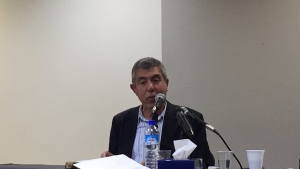 ***Dr Abdul Haq Al Ani is poet, writer, Chartered Electronic Communication Engineer and a Barrister. He is a member of The British Bar. He holds PhD in Microwave Communications Engineering, PhD in International Law, MSc in Electronics Engineering, MSc in Knowledge Engineering, MA in Philosophy and Higher Diploma in Law ﴾Bar Vocational Course﴿, he is the author of several books: Publications: Serab ﴾Poetry Collection in Arabic﴿, Diwan Abi Talib ﴾Poetry Study in Arabic﴿, Trial of Saddam Hussein, Uranium in Iraq: The Legacy of the Iraq Wars and Genocide in Iraq.
***Dr Abdul Haq Al Ani is poet, writer, Chartered Electronic Communication Engineer and a Barrister. He is a member of The British Bar. He holds PhD in Microwave Communications Engineering, PhD in International Law, MSc in Electronics Engineering, MSc in Knowledge Engineering, MA in Philosophy and Higher Diploma in Law ﴾Bar Vocational Course﴿, he is the author of several books: Publications: Serab ﴾Poetry Collection in Arabic﴿, Diwan Abi Talib ﴾Poetry Study in Arabic﴿, Trial of Saddam Hussein, Uranium in Iraq: The Legacy of the Iraq Wars and Genocide in Iraq.

